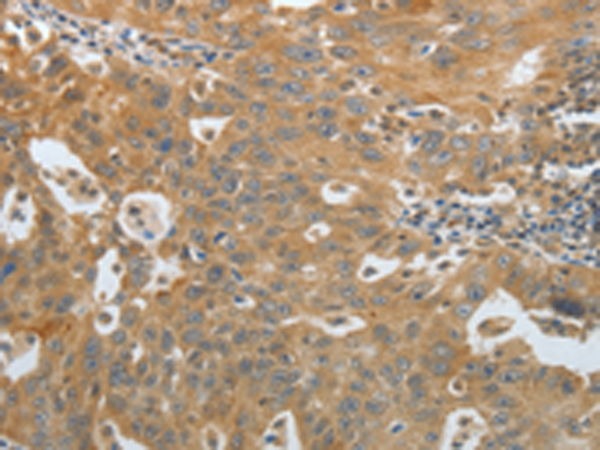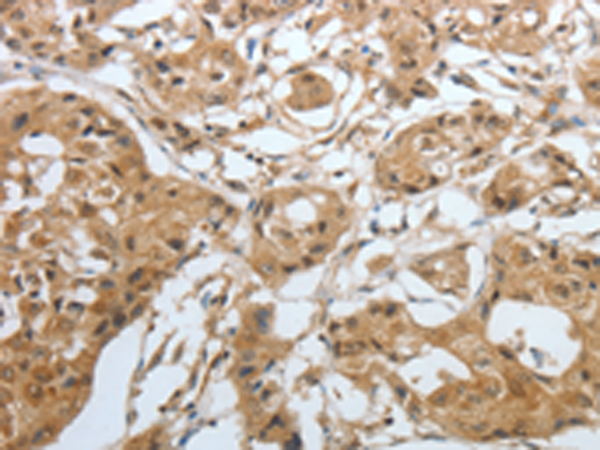


| WB | 咨询技术 | Human,Mouse,Rat |
| IF | 咨询技术 | Human,Mouse,Rat |
| IHC | 1/50-1/200 | Human,Mouse,Rat |
| ICC | 技术咨询 | Human,Mouse,Rat |
| FCM | 咨询技术 | Human,Mouse,Rat |
| Elisa | 1/1000-1/5000 | Human,Mouse,Rat |
| Aliases | AMPH1 |
| WB Predicted band size | 76 kDa |
| Host/Isotype | Rabbit IgG |
| Antibody Type | Primary antibody |
| Storage | Store at 4°C short term. Aliquot and store at -20°C long term. Avoid freeze/thaw cycles. |
| Species Reactivity | Human, Mouse |
| Immunogen | Fusion protein of human AMPH |
| Formulation | Purified antibody in PBS with 0.05% sodium azide and 50% glycerol. |
+ +
以下是3-4篇关于 **抗amphiphysin抗体(AMPH抗体)** 的参考文献及其简要摘要:
---
1. **文献名称**: *"Amphiphysin autoimmunity: paraneoplastic accompaniments"*
**作者**: Pittock, S.J., et al.
**摘要**: 研究报道了抗amphiphysin抗体在副肿瘤性神经综合征(如小脑共济失调、脑脊髓炎)中的特异性关联,尤其多见于乳腺癌和肺癌患者。文章强调了抗体检测对早期肿瘤筛查的重要性。
---
2. **文献名称**: *"Anti-amphiphysin antibodies in patients with paraneoplastic neurological disorders"*
**作者**: Saiz, A., et al.
**摘要**: 分析了抗amphiphysin抗体阳性患者的临床特征,发现其与僵人综合征(stiff-person syndrome)和边缘性脑炎显著相关,提示抗体可能通过干扰突触囊泡循环引发神经功能障碍。
---
3. **文献名称**: *"Paraneoplastic syndromes involving the nervous system"*
**作者**: Darnell, R.B., & Posner, J.B.
**摘要**: 综述类文章,指出抗amphiphysin抗体是副肿瘤性神经疾病的生物标志物之一,尤其在乳腺癌和妇科肿瘤患者中,抗体介导的自身免疫反应可导致中枢及周围神经损伤。
---
4. **文献名称**: *"Autoimmune encephalitis with anti-amphiphysin antibodies: a distinct syndrome?"*
**作者**: McKeon, A., et al.
**摘要**: 探讨了抗amphiphysin抗体阳性脑炎患者的独特临床表现(如肌阵挛、舞蹈症),提出其可能代表一种新型自身免疫性脑炎亚型,需结合免疫治疗和肿瘤切除改善预后。
---
**注**:AMPH抗体通常与副肿瘤性神经综合征相关,上述文献聚焦其诊断价值、临床表型及机制研究。如需具体年份或期刊,可进一步补充。
AMPH antibodies target amphiphysin, a protein primarily involved in synaptic vesicle endocytosis within nerve terminals. Discovered in the 1990s, amphiphysin plays a critical role in clathrin-mediated membrane recycling, facilitating neurotransmitter release. Its association with autoimmunity emerged when AMPH antibodies were linked to paraneoplastic neurological syndromes (PNS), particularly stiff-person syndrome (SPS) and encephalomyelitis. These antibodies are often detected in patients with underlying malignancies, most commonly breast and lung cancers, where they arise due to cross-reactivity between tumor antigens and neuronal proteins.
AMPH antibodies are IgG-type autoantibodies that disrupt synaptic function by interfering with amphiphysin’s interaction with other endocytic proteins, such as dynamin and clathrin. This disruption impairs vesicle recycling, leading to neurological symptoms like muscle rigidity, spasms, and autonomic dysfunction. Diagnostic testing typically involves serum or cerebrospinal fluid (CSF) analysis using techniques like immunohistochemistry, cell-based assays, or Western blot. Early detection is crucial, as AMPH antibody-related PNS often precedes cancer diagnosis, guiding oncological screening.
Research continues to explore amphiphysin’s broader roles in neurobiology and its potential as a biomarker for both neurological autoimmunity and cancer. Immunotherapy, including intravenous immunoglobulins or plasmapheresis, may alleviate symptoms, though cancer treatment remains central to managing paraneoplastic cases.
×